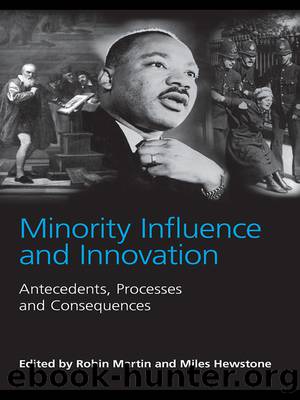Minority Influence and Innovation by Martin Robin;Hewstone Miles;

Author:Martin, Robin;Hewstone, Miles;
Language: eng
Format: epub
Tags: Behavioral Sciences
Publisher: Taylor & Francis Group
Published: 2009-12-11T00:00:00+00:00
Main-effect models
Maass and Clark (1983), who were the first to apply dual-process theories of attitude change to minority and majority influence, translated the language of Moscoviciâs conversion theory directly into that of dual-process theories, suggesting that minorities induce active thinking (i.e., systematic processing) leading to permanent attitude change, whereas majorities trigger heuristic information processing, leading only to public compliance. Respondents, who had been selected to hold relatively neutral attitudes towards gay rights, were provided with a transcript of a group discussion on gay rights. In this discussion a minority of one gave eight arguments in favour of gay rights while a majority of four presented eight statements opposing gay rights (or vice versa). Thus, participants were simultaneously exposed to minority and majority influence.2 In order to highlight the uncompromising consistency of the minority, which Moscovici considered a key aspect of their influence, Maass and Clark added a one-sentence statement to the end of the summary, which explained that the minority individual did not change her opinion during the course of the discussion. According to Kelleyâs (1973) augmentation principle, this should trigger the perception of the minority individual as firmly committed to his/her position. Subsequently, participants were asked to indicate their own position on gay rights, expecting it either to be publicly disclosed or to remain private. In support of their theoretical predictions, Maass and Clark (1983) found that minority sources induced greater attitude change than majorities when the attitude measure was taken in private, whereas a greater majority effect was found when respondents believed that their attitudes would be disclosed in public. Although there was no source effect on the quantity of thoughts, there was a tendency for minorities to trigger thoughts that were supportive of their position. Furthermore, hierarchical regression analysis conducted to assess mediation resulted in a pattern that was consistent with the assumption that private acceptance but not public compliance was mediated by the message recipientsâ generation of arguments and counter-arguments.
Although this pattern of results was supportive of the predictions offered by Maass and Clark (1983), it is actually quite puzzling, if one looks at it from the perspective of the goal conflict created by their experimental manipulations. Maass and Clark (1983) appeared to have induced a conflict in their research participants, between the goals to be correct and to be liked by the majority. Given that the attitude issue was not very involving to these research participants, they could have easily resolved this goal conflict by accepting the majority position. Instead, they were privately persuaded by the minority, but avoided the cost of dissent by paying lip service to the majority.
Why did they pay so much attention to the minority so as to engage in systematic thinking on a topic that was not really involving? I suspect that the effect is due to the way in which Maass and Clark (1983) manipulated source status by creating real numerical minorities in a group situation and to the uncompromising consistency of their minority source. It would seem plausible
Download
This site does not store any files on its server. We only index and link to content provided by other sites. Please contact the content providers to delete copyright contents if any and email us, we'll remove relevant links or contents immediately.
Rewire Your Anxious Brain by Catherine M. Pittman(18217)
Talking to Strangers by Malcolm Gladwell(12804)
The Art of Thinking Clearly by Rolf Dobelli(9820)
Mindhunter: Inside the FBI's Elite Serial Crime Unit by John E. Douglas & Mark Olshaker(8658)
Becoming Supernatural by Dr. Joe Dispenza(7801)
Change Your Questions, Change Your Life by Marilee Adams(7328)
The Road Less Traveled by M. Scott Peck(7242)
Nudge - Improving Decisions about Health, Wealth, and Happiness by Thaler Sunstein(7204)
The Lost Art of Listening by Michael P. Nichols(7114)
Mastermind: How to Think Like Sherlock Holmes by Maria Konnikova(6900)
Enlightenment Now: The Case for Reason, Science, Humanism, and Progress by Steven Pinker(6850)
Win Bigly by Scott Adams(6795)
The Way of Zen by Alan W. Watts(6261)
Daring Greatly by Brene Brown(6195)
Big Magic: Creative Living Beyond Fear by Elizabeth Gilbert(5308)
Grit by Angela Duckworth(5268)
Men In Love by Nancy Friday(4940)
Ego Is the Enemy by Ryan Holiday(4896)
Altered Sensations by David Pantalony(4835)
